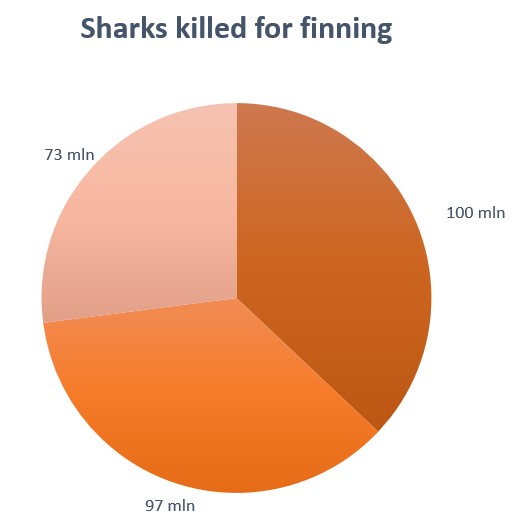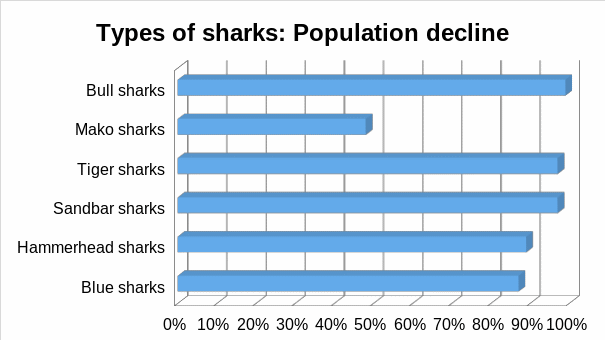Nowadays, much attention is paid to the problem of shark finning around the world. Millions of sharks are killed annually for their fins, and many of them are dropped back to the ocean finless where they die because of suffocation. In many countries, the idea of shark finning remains illegal and unethical, but the possibility to earn huge money cannot be ignored (Dell’Apa et al. 151). Shark finning is the process of removal of fins of sharks and discarding them back at sea or ocean with the only purpose to earn money and cook shark fin soups which are popular in China (Friedrich et al. 3). Regarding available technologies, market economies, trade relations, and cheap employment, it does not take much time to organize special trips for shark hunting. Trade of shark fins is alive and well developed in such countries as the United States and China. However, the number of people who are eager to try shark fin soup has considerably decreased during the last several years because of the popularity of anti-shark fin soup campaigns and laws supported worldwide (Mosbergen). The situation continues changing in China.
Shark finning depends directly on the work of airline companies and their readiness to transport fins. During the last several decades, the idea to ban shark fin cargo on airline flights has been supported globally (Mosbergen). In China, Air China was the first airline that supported this ban and became an example for many other organizations proving that “the awareness of the unsustainability of the global shark trade” (Mosbergen). In less than one year, a number of Chinese organizations supported Air China, and China Southern Airlines was one of them. Being one of the biggest carriers in the country, China Southern Airlines gave a promise to “actively participate in animal conservation” (Lee). At this moment, about 50% of international airlines participate in this campaign and prove that it is a crucial step in promoting eco- and environmentally friendly decisions (Lee). There are many other alternatives to reduce the negative outcomes of shark finning, and China Southern Airlines should learn these options.
China is defined as an aggressor whose culture and traditions gave birth to the idea of shark fin soup offered in public restaurants. This cooking idea results in about 73 million sharks being killed annually for their fins (Mosbergen). People who are aware of the statistics or details of shark finning declare their opposition to this industry in public. However, single voices and certain situations are not enough to solve this problem. Therefore, the decision of China Southern Airlines to ban shark fin cargo seems to be a brilliant solution. In addition to the necessity to spend more money, shark killers and managers have to search for new options to transport their products. The European Union is the main supplier of shark products, including meat, jaws, and fins to Hong Kong (Friedrich 5). Air transportation is the most convenient method. Still, the more airlines, including China Southern Airlines, refuse this type of product be transported, the more problems and challenges shark killers and suppliers may face.
Unfortunately, not all airline companies are ready to reject shark transportation because it is a good way to earn money. Shark finning is a social type of responsibility (Lee). Environmentalists do everything possible to promote campaigns against the shark trade, and China Southern Airlines believe that shark population decline can be stopped one day.

The step taken by China Southern Airline may be explained through the available statistical data and the impact of shark killing on a general environmental image. During the last several decades, the number of sharks killed for the purpose of fins for soup has considerably changed, proving that shark fin bans and campaigns make a point. For example, at the beginning of the 2000s, more than 100 million sharks were killed annually (see fig.1). Thousands of airline companies participated in these products transportation, and all activities were legal and approved. At the beginning of the 2010s, the number of shark deaths decreased up to 97 million per year. Nowadays, the reports show that about 73 million sharks die annually because of the finning need.

There are many types of sharks that can be used for finning. The analysis of their population proves that some sharks are frequently fished and killed by people. For example, the decline of the population of bull sharks (up to 99%) is one of the highest in comparison to the representatives of other types (see fig. 2). Tiger and sandbar sharks are also used for finning and transported to China from different parts of the world. The decline of the population of hammerhead and blue sharks is not as high as other types, still, it is remarkable in the industry (up to 85%) (see fig. 2). Mako sharks are the survivors. Still, it is hard to say if such small decline in population is explained due to their rarity or abilities to hide from fishers.
Table 1. List of Chinese Airline Companies to Support Shark Fin Ban. (Own design).
Not all companies are ready to support the idea of banning shark finning in the world. However, the step that is taken by airlines globally proves that people have already started thinking about the impact of this activity on the environment. Though the problem of shark distinction was discovered several decades ago, many Chinese airlines approved their bans on transportation of shark fins only several years ago. China Airlines of Taiwan took this step in 2014 (see table 1). In 2016, three more companies joined the same campaign. In 2017, a list of the airlines with the ban on shark fins’ transportation was enlarged by six new companies, including China Southern Airlines.
Table 2. Legislation to Support Shark Fin Ban. (“Laws Protecting Sharks”).
There are many legal steps taken to support shark finning ban. Chinese Southern Airlines can base their decision on one of the aspects mentioned in the list (see table 1). Landing of sharks has to be performed according to certain requirements defined by international organizations.
Works Cited
Dell’Apa, Andrea, et al. “The Influence of Culture on the International Management of Shark Finning.” Environmental Management, vol. 54, no. 2, 2014, pp. 151-161.
Friedrich, Laura A., et al. “Public Perceptions of Sharks: Gathering Support for Shark Conservation.” Marine Policy, vol. 47, 2014, pp. 1-7. Web.
“Laws Protecting Sharks.” Shark Savers, 2018. Web.
Lee, Danny. “China’s Biggest Airline Ban Shark Fin Cargo.” South China Morning Post, 2017. Web.
Mosbergen, Dominique. “Air China Makes History with Shark Fin Ban.” Huffington Post, 2017. Web.
